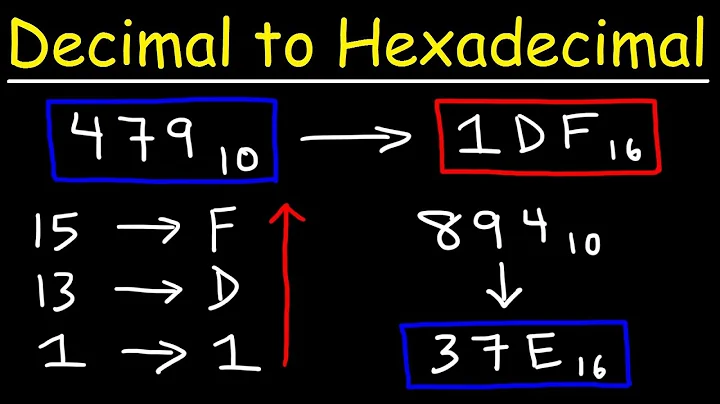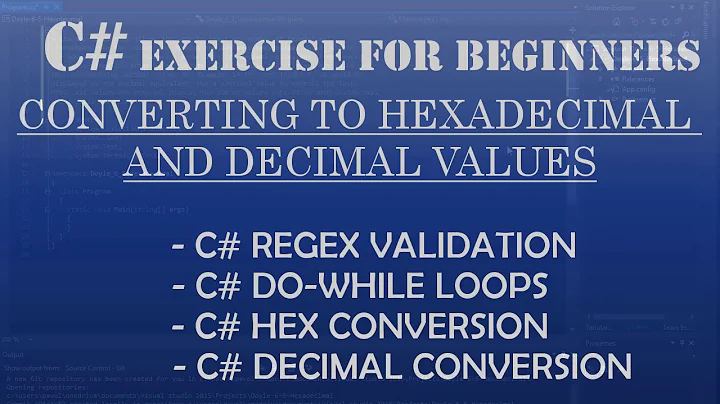Convert a list of decimal values in a text file into hex format
Solution 1
You can do this using printf and bash:
printf '%08x\n' $(< test.txt)
Or using printf and bc...just...because?
printf '%08s\n' $(bc <<<"obase=16; $(< test.txt)")
In order to print the output to a text file just use the shell redirect > like:
printf '%08x\n' $(< test.txt) > output.txt
Solution 2
Three possible solutions (assuming each line is a set of only digits):
For shells like ksh, bash, zsh:
printf '%08x\n' $(<infile)
Only for bash
<file.txt mapfile -t arr; printf '%08x\n' "${arr[@]}"
For simpler shells: dash (the default sh in Debian based systems), ash (busybox emulated shell), yash and some default shells in AIX and Solaris:
printf '%08x\n' $(cat infile)
In fact, for a shell like the heirloom version (Bourne like) it needs to be written like (which do work on all posix shells listed above but I strongly recommend to do not use it ):
$ printf '%08x\n' `cat infile`
Answer to EDIT #1
Understand that an hex value of 80000000 will cause overflow on a 32 bit computer (not common this days, but possible). Check that echo "$((0x80000000))" do not print a negative value.
$ for i in $(<infile); do printf '%08x\n' "$(($i+0x80000000))"; done
80020000
80030000
80040000
80050000
80060000
Solution 3
Using awk:
$ awk '/[0-9]/ { printf("%08x\n", $0) }' file
00020000
00030000
00040000
00050000
00060000
Solution 4
Yet another one-liner. Still not python, but which allows comments, empty lines and whatever in the file, and only prints out the result for lines which contain only a number.
perl -ne '/^(\d+)$/ && printf "%08x\n", $1' $your_file
Given a file like this:
$ cat $your_file
# some numbers,
131072
196608
262144
327680
393216
and empty lines
and whatever...
It prints
00020000
00030000
00040000
00050000
00060000
Solution 5
Here are a couple of one line solutions in PHP:
<?php
foreach (file('test.txt') as $s) echo dechex(+$s), "\n";
<?php
array_map(fn($s) => print dechex(+$s) . "\n", file('test.txt'));
Related videos on Youtube
minto
Updated on September 18, 2022Comments
-
 minto over 1 year
minto over 1 yearI have a need to convert a list of decimal values in a text file into hex format, so for example test.txt might contain:
131072 196608 262144 327680 393216 ...the output should be list of hex values (hex 8 digit, with leading zeroes):
00020000 00030000 00040000 ...the output is printed into the text file. How to make this with python or linux shell script?
EDIT #1
I missed one extra operation: I need to add
80000000hex to each of the created hex values. (arithmetic addition, to apply to already created list of hex values). -
 minto almost 6 yearsThis code add extra 8-bit at the end
minto almost 6 yearsThis code add extra 8-bit at the end00000000. -
 Kusalananda almost 6 years@minto Did you run the command on a file that had
Kusalananda almost 6 years@minto Did you run the command on a file that had...on the last line? If so, then yes. It would convert all values to hexadecimal, even empty lines. Data that can not be converted to an integer would be taken as zero. -
 minto almost 6 yearsyes, the file have an empty newline at end of file, but empty, no dots.
minto almost 6 yearsyes, the file have an empty newline at end of file, but empty, no dots. -
 Kusalananda almost 6 years@minto See updated answer. The updated answer outputs only if the input line contains a number. How big is your file?
Kusalananda almost 6 years@minto See updated answer. The updated answer outputs only if the input line contains a number. How big is your file? -
 minto almost 6 yearsFile have just 64 lines.
minto almost 6 yearsFile have just 64 lines. -
Dani_l almost 6 yearsYou should use bc as primary (only?) answer. bc is arbitrary precision, printf will fail for large numbers.
-
 jesse_b almost 6 years@Dani_l: I don't know of any way to reliably pad the bc output with zeros the way OP wants without using printf.
jesse_b almost 6 years@Dani_l: I don't know of any way to reliably pad the bc output with zeros the way OP wants without using printf. -
 minto almost 6 yearsHow to add
minto almost 6 yearsHow to add80000000hex value to each of the created hex values? I mean something likeprintf "%X\n" $((80000000 + 0x$b)) b=list of hex values -
Grump almost 6 years@Dani_l, the OP's requirement to output in 8 hex digit format will fail for large numbers. I assume he meant 8 hexit when he used 8 bit.
-
mivk almost 6 years@minto : If I understand what you mean, you could replace
$1in the example above with$1+hex("80000000")or$1+2147483648. The output would then be80020000,80030000, etc. -
 minto almost 6 yearsbut I have no perl.
minto almost 6 yearsbut I have no perl. -
mivk almost 6 yearsYou used
linuxin your tags. I know of no Linux (or Unix) distribution which doesn't come with Perl in the base install. Even Mac OS X has it. -
Dani_l almost 6 years@Grump the OP's requirement is satisfied automatically by the addition operation, as the ouput would always b 8 or more digits, and reducing the number of digits doesn't make sense in an addition operation.
-
Grump almost 6 yearsexactly, the requirement is 8 digits, not 8 or more.
-
Dani_l almost 6 yearsProbably should use while read instead of for loop of file contents. unix.stackexchange.com/questions/169716/… ; mywiki.wooledge.org/DontReadLinesWithFor
-
 done almost 6 yearsAs I said in the first line: "assuming each line is a set of only digits" it makes no difference to add the complexity of read. @Dani_I
done almost 6 yearsAs I said in the first line: "assuming each line is a set of only digits" it makes no difference to add the complexity of read. @Dani_I -
 minto almost 6 years@Isaac maybe some clarification should be done regarding hex value of 80000000 that may cause potential overflow on a 32 bit computer. 80000000 is the base address of the flash chip in the embedded system. Base address chosen by device manufacturer, so likely allowed by the processor’s memory controller. I'm not sure it can cause overflow in this case.
minto almost 6 years@Isaac maybe some clarification should be done regarding hex value of 80000000 that may cause potential overflow on a 32 bit computer. 80000000 is the base address of the flash chip in the embedded system. Base address chosen by device manufacturer, so likely allowed by the processor’s memory controller. I'm not sure it can cause overflow in this case. -
 done almost 6 years@minto In answer to your comment
done almost 6 years@minto In answer to your commentI'm not sure it can cause overflow in this caseI have to say: I do not know if you are running the shell inside the same system that use that memory address. You may be developing and compiling on one computer and then sending the compiled code to the embedded system. Or ... you may be running the shell inside the embedded system, in which case it seems reasonable to expect that the shell has been compiled to run in that system and that the shell has been compiled with the same bit size. But I can not know that both facts are true.




